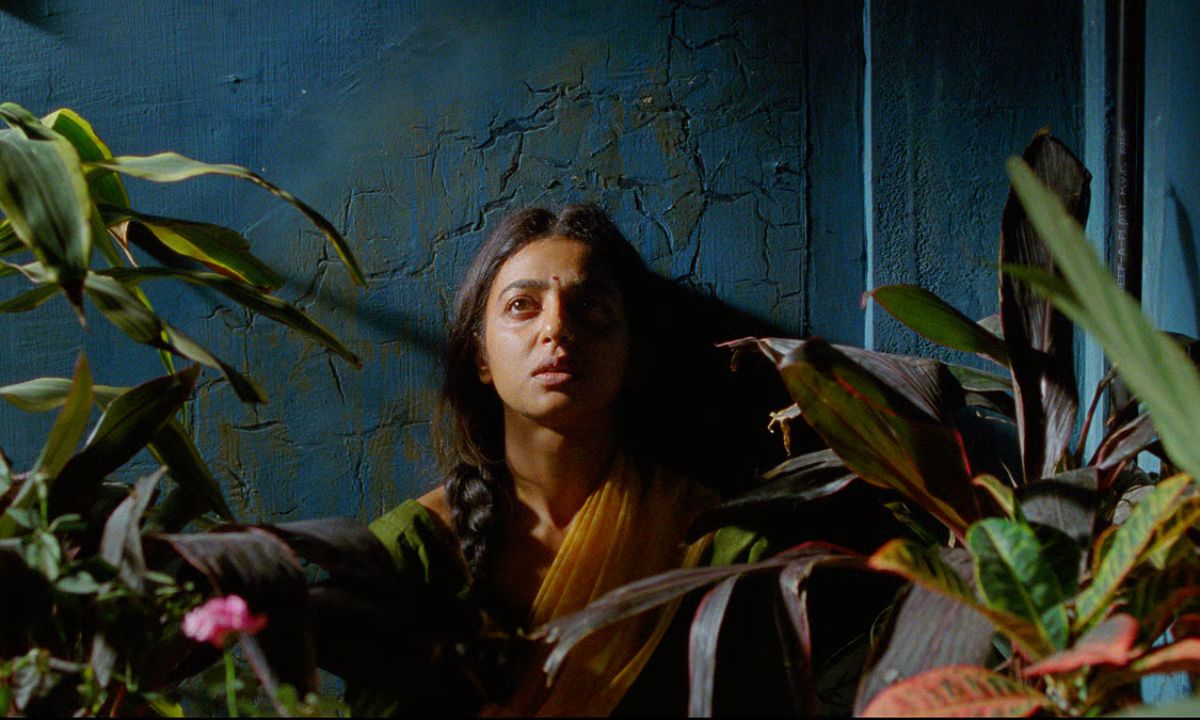It took British filmmaker Karan Kandhari 10 years to make Sister Midnight because people who fund your movie require an explanation of the premise, and this one flatly refuses to give a coherent one. Premiering at Cannes last year in the Directors’ Fortnight segment, the horror-black comedy finally received its full-length Indian release this month. Sister Midnight is absurd and off-putting, yet it’s also a story about loneliness and what it can turn you into. Written and directed by Kandhari, the film stars Radhika Apte as the revolting Uma, supported by Ashok Pathak’s Gopal and Chhaya Kadam’s Sheetal. Now playing in select theatres near you, read on to know our thoughts about Sister Midnight.
Plot Of Sister Midnight
Staying committed to the non-explainable bit, the plot does not follow a traditional linear formula. Instead, it takes us on a gradual descent into what feels like a collective psychosis. Uma (Radhika Apte), a divorcee, moves into a one-room shanty in the urban slums of Mumbai after an arranged marriage to Gopal, a man she’s spoken to maybe twice during childhood. Uma is anything but your conventional housewife. She can’t cook, clean, or budget for the month, the skills drilled into Indian housewives. Her husband, Gopal (Ashok Pathak), exists in Uma’s world more as a recurring character than a partner, someone who comes home to sleep and leaves for work without intimacy or much connection, except for the rare moments they share a cigarette.
Frustrated by the monotony, Uma lands a sweeping job near Churchgate. As she walks the long distance to her office, we witness the beginning of her spiral. Her growing urge to take life to control her own marks the start of an absurd journey.
Performances
Radhika Apte, as Uma, is the heart and soul of Sister Midnight. Her performance is phenomenal, capturing every unhinged, demented moment of the character with startling ease. Every feral instinct Uma acts on is portrayed with such conviction that Apte becomes both disturbing and darkly hilarious to watch. She’s off-putting, nonchalant, and wickedly funny in the role. It’s hard to imagine anyone else playing Uma.
Ashok Pathak impresses as the diffident Gopal, a quiet service worker who keeps to himself. His subdued presence provides the perfect counterbalance to Apte’s erratic energy. And though her screen time is brief, Chhaya Kadam is a delight as Sheetal, Uma’s only friend and neighbour who brings a grounded charm to the chaos around her.
Verdict- An Absurd Yet Creative Film Deconstructing Norms
Since Sister Midnight doesn’t follow a linear narrative, it won’t be everyone’s cup of tea. No hero is swooping in to save the day, or a villain wanting destruction. Instead, it’s the journey of a woman succumbing to her deepest, most innate desires, an attempt to find her own version of normal.
Visually, the film wears its Wes Anderson influence on its sleeve. Cinematographer Sverre Sørdal paints Mumbai in bold, surreal colours, and frames characters in long, static shots that feel distinctly Anderson-esque. The soundtrack, old-school American pop rock, should clash with the film’s gritty, lower-class Mumbai setting, but somehow, it doesn’t.
The film is full of sharp, witty dialogue, with moments of human depth. Then there are the stop-motion goats, which feel like they’ve walked out of a Wes Anderson fever dream. But that’s the thing. Absurdism like this is a rarity in Indian cinema. It’s a genre usually reserved for arthouse films from other continents. That’s what makes Sister Midnight feel refreshing, it dares to be bizarre.
Also Read: Lilo & Stitch Review: This Film Is Another Reason Why Disney Should Leave Its Classics Untouched
That said, the film struggles with pacing and direction. At times, things keep happening, entertaining, yes, but the emotional connection with Uma feels strained. We don’t quite get under her skin the way we need to. Glimpses of hope emerge in her dynamic with Gopal, but when it’s time to delve into Uma’s real turmoil, the film holds back a bit.
Sister Midnight is a film about individualism and how it feeds into loneliness, how one harbors or grows into it. Director Karan Kandhari has said the film is about characters who exist in a world that gives them no manual on how to be adults, and we couldn’t agree more. Heavy on the no manual part.
Also Read: Karate Kid: Legends Review: Jackie Chan, Ben Wang Starrer Brings Action But Lacks Depth!

